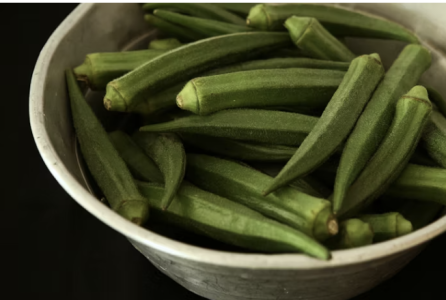Doctors are stunned by this $4 grocery store find being called "natural Ozempic"—are you missing out?
- Replies 0
If you’ve been anywhere near a pharmacy or a health headline lately, you’ve probably heard about Ozempic—the prescription medication that’s become a household name for its dramatic effects on weight loss and blood sugar.
But what if we told you there’s a humble, $4 vegetable sitting quietly in your local grocery store that scientists are calling a "natural Ozempic"? And no, it’s not some exotic superfood you’ll have to hunt down at a specialty market.
Let’s dig into the science, the benefits, and—most importantly—how you can bring this powerhouse into your kitchen (without any culinary acrobatics).
Okra, sometimes called "lady’s fingers," is a staple in many cuisines but often gets passed over in American grocery carts. Priced at around $4 per pound, it’s affordable, versatile, and—according to new research—may pack a punch when it comes to fighting obesity, high blood sugar, and cholesterol.
Brazilian researchers recently put okra to the test in a study that’s turning heads. Their findings? Okra may help reduce body fat, improve blood sugar and cholesterol levels, and even protect vital organs like the liver from obesity-related damage.
That’s a tall order for a vegetable that’s usually relegated to the side dish section! The research, published in Brain Research, used rats to simulate the effects of early-life overnutrition (think: too many calories, too soon—a risk factor for obesity and diabetes later in life).
Some rats were overfed as babies, while others had a standard diet. At three weeks old, all the rats were split into two groups: one got a regular diet, and the other got a diet with 1.5% okra added in.

Rats that were overfed early in life and then given okra had lower blood sugar and cholesterol, better glucose tolerance, and even improved muscle mass compared to their non-okra-eating peers. Their brains showed less inflammation and responded better to insulin—a key factor in controlling hunger and energy.
Rats that weren’t at risk for obesity didn’t see much difference, suggesting okra’s benefits are most powerful for those already facing metabolic challenges.
While these results are from animal studies, the implications are exciting. The researchers credit okra’s high levels of catechins (the same antioxidants found in green tea), quercetin, and other phenolic compounds for these effects.
These antioxidants are known to fight inflammation, support heart health, and may even help prevent chronic diseases.
Okra isn’t just a one-trick pony. Here’s what else it brings to the table:
- High Fiber: Just half a cup of cooked okra delivers over 2 grams of fiber—nearly 10% of your daily needs. Fiber helps slow the absorption of sugar and carbs, keeping blood sugar steady and you feeling full longer.
- Vitamins and Minerals: That same serving gives you 32 micrograms of Vitamin K (for bone and blood health), 14 mg of Vitamin C (for immunity and iron absorption), and 37 micrograms of folate (for cell growth and repair).
- Potential Cancer and Bone Benefits: Some studies suggest okra may reduce the risk of colon cancer and support bone health, thanks to its nutrient profile.
If you’re new to okra, you might be wary of its reputation for being "slimy." But don’t let that scare you off! Here are some easy, delicious ways to add okra to your meals:
- Roast It: Toss sliced okra with olive oil, salt, and pepper, then roast at 425°F for 20 minutes. The high heat crisps it up and cuts down on the goo.
- Add to Soups and Stews: Okra’s natural thickening power is perfect for gumbo, but it also works in vegetable soups and curries.
- Grill or Sauté: Quick-cooking okra on the grill or in a hot pan brings out its nutty flavor and keeps the texture firm.
- Eat It Raw: Slice it thin and add to salads or salsas for a crunchy, fresh bite.
Let’s be clear: okra isn’t a magic bullet, and it’s not a direct replacement for prescription medications like Ozempic, especially for those with diabetes or serious metabolic conditions. But as part of a healthy diet, it’s a low-cost, low-risk way to support your body’s natural defenses against obesity, high blood sugar, and inflammation.
Registered dietitian Dr. Sereen Zawahri Krasuna, who wasn’t involved in the study, puts it simply: "Okra may not be at the top of most people’s grocery lists. But it’s easier than you’d think to use in the kitchen. Okra’s health benefits definitely make it worth the effort."
If you’re looking for a simple, affordable way to boost your health, okra is a smart pick—especially if you’re concerned about blood sugar, cholesterol, or weight. While we wait for more human studies, the evidence so far is promising, and the risks are low.
 We want to hear from you! Have you cooked with okra before? Do you have a favorite recipe or a tip for making it less slimy? Or maybe you’re curious about other "hidden gems" in the produce aisle? Share your thoughts, questions, and kitchen adventures in the comments below.
We want to hear from you! Have you cooked with okra before? Do you have a favorite recipe or a tip for making it less slimy? Or maybe you’re curious about other "hidden gems" in the produce aisle? Share your thoughts, questions, and kitchen adventures in the comments below.
But what if we told you there’s a humble, $4 vegetable sitting quietly in your local grocery store that scientists are calling a "natural Ozempic"? And no, it’s not some exotic superfood you’ll have to hunt down at a specialty market.
Let’s dig into the science, the benefits, and—most importantly—how you can bring this powerhouse into your kitchen (without any culinary acrobatics).
Okra, sometimes called "lady’s fingers," is a staple in many cuisines but often gets passed over in American grocery carts. Priced at around $4 per pound, it’s affordable, versatile, and—according to new research—may pack a punch when it comes to fighting obesity, high blood sugar, and cholesterol.
Brazilian researchers recently put okra to the test in a study that’s turning heads. Their findings? Okra may help reduce body fat, improve blood sugar and cholesterol levels, and even protect vital organs like the liver from obesity-related damage.
That’s a tall order for a vegetable that’s usually relegated to the side dish section! The research, published in Brain Research, used rats to simulate the effects of early-life overnutrition (think: too many calories, too soon—a risk factor for obesity and diabetes later in life).
Some rats were overfed as babies, while others had a standard diet. At three weeks old, all the rats were split into two groups: one got a regular diet, and the other got a diet with 1.5% okra added in.

Okra may help reduce body fat, improve blood sugar and cholesterol levels, and even protect vital organs like the liver from obesity-related damage. Image source: Neha Deshmukh / Unsplash
Rats that were overfed early in life and then given okra had lower blood sugar and cholesterol, better glucose tolerance, and even improved muscle mass compared to their non-okra-eating peers. Their brains showed less inflammation and responded better to insulin—a key factor in controlling hunger and energy.
Rats that weren’t at risk for obesity didn’t see much difference, suggesting okra’s benefits are most powerful for those already facing metabolic challenges.
While these results are from animal studies, the implications are exciting. The researchers credit okra’s high levels of catechins (the same antioxidants found in green tea), quercetin, and other phenolic compounds for these effects.
These antioxidants are known to fight inflammation, support heart health, and may even help prevent chronic diseases.
Okra isn’t just a one-trick pony. Here’s what else it brings to the table:
- High Fiber: Just half a cup of cooked okra delivers over 2 grams of fiber—nearly 10% of your daily needs. Fiber helps slow the absorption of sugar and carbs, keeping blood sugar steady and you feeling full longer.
- Vitamins and Minerals: That same serving gives you 32 micrograms of Vitamin K (for bone and blood health), 14 mg of Vitamin C (for immunity and iron absorption), and 37 micrograms of folate (for cell growth and repair).
- Potential Cancer and Bone Benefits: Some studies suggest okra may reduce the risk of colon cancer and support bone health, thanks to its nutrient profile.
If you’re new to okra, you might be wary of its reputation for being "slimy." But don’t let that scare you off! Here are some easy, delicious ways to add okra to your meals:
- Roast It: Toss sliced okra with olive oil, salt, and pepper, then roast at 425°F for 20 minutes. The high heat crisps it up and cuts down on the goo.
- Add to Soups and Stews: Okra’s natural thickening power is perfect for gumbo, but it also works in vegetable soups and curries.
- Grill or Sauté: Quick-cooking okra on the grill or in a hot pan brings out its nutty flavor and keeps the texture firm.
- Eat It Raw: Slice it thin and add to salads or salsas for a crunchy, fresh bite.
Let’s be clear: okra isn’t a magic bullet, and it’s not a direct replacement for prescription medications like Ozempic, especially for those with diabetes or serious metabolic conditions. But as part of a healthy diet, it’s a low-cost, low-risk way to support your body’s natural defenses against obesity, high blood sugar, and inflammation.
Registered dietitian Dr. Sereen Zawahri Krasuna, who wasn’t involved in the study, puts it simply: "Okra may not be at the top of most people’s grocery lists. But it’s easier than you’d think to use in the kitchen. Okra’s health benefits definitely make it worth the effort."
If you’re looking for a simple, affordable way to boost your health, okra is a smart pick—especially if you’re concerned about blood sugar, cholesterol, or weight. While we wait for more human studies, the evidence so far is promising, and the risks are low.
Key Takeaways
- Brazilian researchers found that okra, an inexpensive vegetable sold in most supermarkets, may help reduce body fat, improve blood sugar and cholesterol levels, and protect organs from obesity-related damage—effects similar to Ozempic, but for a fraction of the price.
- In rat studies, okra supplementation after early-life overfeeding led to better blood sugar control, improved muscle mass, reduced brain inflammation, and increased insulin sensitivity—particularly benefiting those at higher risk of metabolic issues.
- Okra’s health benefits are linked to its high fiber and antioxidant content (including catechins, also found in green tea), which support heart health, may help prevent disease, and assist in controlling blood sugar.
- While more human research is needed, scientists and dietitians suggest that adding antioxidant-rich okra to your diet might be a simple, affordable way to lower your risk of metabolic diseases in the long run.






